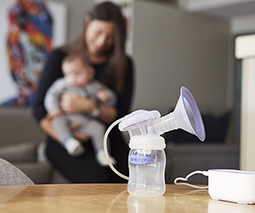Research shows that too many babies are being diagnosed with tongue-ties

Tongue-tie is a condition that can make it difficult for newborns to breastfeed; however, a recent study shows that many breastfeeding babies are being referred for surgery for tongue-tie that they may not necessarily need.
What is tongue-tie?
Tongue-tie is when the tongue is attached to the floor of the mouth by a web of tissue called the lingual frenulum. According to John Hopkins Hospital, tongue-tie is when this tissue is shortened or thickened, limiting the movement of the tongue or tethering it too close to the tongue. This can be corrected by a surgical procedure called a frenotomy, which is when the lingual frenulum is cut.
While tongue-tie is often cited as a cause for breastfeeding difficulties in newborns, it’s not the only cause of such problems. However, there has been a rise in the number of breastfeeding babies being diagnosed with tongue-tie, prompting a recent study to look into whether or not surgery is always necessary.
Are breastfeeding babies being over-diagnosed?
The study, which was published in JAMA Otolaryngology-Head & Neck Surgery, looked at just 115 newborns referred for tongue tie surgery and/or upper lip tether surgery. According to Science Daily, nearly 63 percent of children ended up not needing the procedure. The study showed that they were, in fact, able to breastfeed successfully after a feeding evaluation from a multidisciplinary team of clinicians.
“We have seen the number of tongue-tie and upper lip tether release surgeries increase dramatically nationwide without any real strong data to show these are effective for breastfeeding,” author on the study, Christopher Hartnick, Director of the Division of Pediatric Otolaryngology at Massachusetts Eye and Ear. “We don’t have a crystal ball that can tell us which infants might benefit most from the tongue-tie or upper lip release, but this preliminary study provides concrete evidence that this pathway of a multidisciplinary feeding evaluation is helping prevent babies from getting this procedure.”
Too soon?
According to the Huffington Post, Christopher now receives referrals for such procedures for up to five newborns a week. And while the procedure is quick and considered to be relatively pain-free, it is costly and still carries some risk such as infection. This study prompts the question of whether surgery is performed too soon, and perhaps there are other ways to help with breastfeeding that do not involve unnecessary surgery.
“We’ve learned that interdisciplinary collaboration is key to a thorough feeding evaluation,” says study co-author Cheryl Hersh, a paediatric speech-language pathologist at MassGeneral Hospital for Children to the Huffington Post. “This is still a work in progress, but we have learned a great deal about what we can do differently to help our patients and their families. In doing so, we have been able to identify many babies who are having breastfeeding problems that are not related to their lip and tongue anatomy.”









